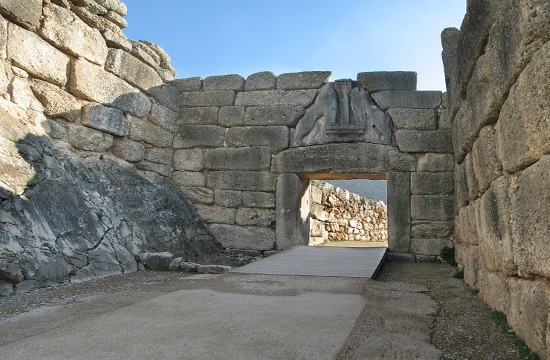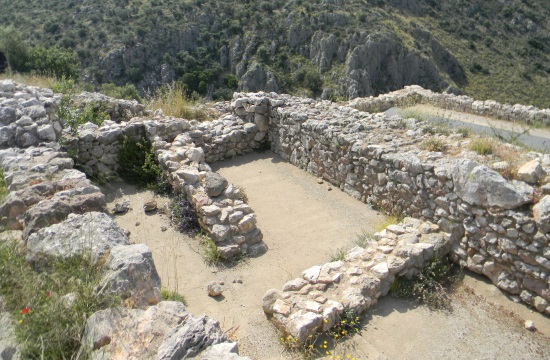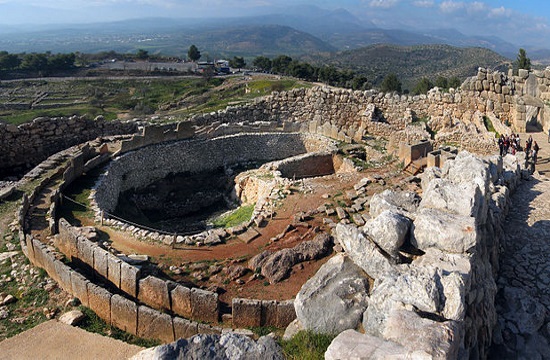New study finds: Ancient Mycenaean civilization might have collapsed due to uprising or invasion
 The prevailing theory until now has been that Mycenaean palaces had been destroyed by devastating earthquakes
The prevailing theory until now has been that Mycenaean palaces had been destroyed by devastating earthquakes
For many years, the prevailing theory on how the Mycenaean civilisation collapsed was that devastating earthquakes led to the destruction of its palaces in the Peloponnese, southern Greece around 1,200 BC.
Nevertheless, new evidence suggests that some type of internal uprising or an external invasion might have brought about the downfall of the Mycenaean civilisation.
From 2012, a team led by German archaeologist Joseph Maran of Heidelberg University and geophysicist Klaus-G. Hinzen has been conducting research in Tiryns and Midea. The findings of their research were published in the Bulletin of the Seismological Society of America.
“Although some of the observations from the two investigated citadels could be explained by seismic loading, alternative nonseismic causes could equally explain most observed damage. In some cases, the structural damage was clearly not caused by earthquakes”, they stressed in the study, adding that: “Our results indicate that the hypothesis of a destructive earthquake in Tiryns and Midea, which may have contributed to the end of the LBA Mycenaean palatial period, is unlikely”.
The Mycanean civilization
Mycenaean Greece (or Mycenaean civilization) was the last phase of the Bronze Age in Ancient Greece, spanning the period from approximately 1600–1100 BC. It represents the first advanced civilization in mainland Greece, with its palatial states, urban organization, works of art and writing system. Among the centers of power that emerged, the most notable were those of Pylos, Tiryns, Midea in the Peloponnese, Orchomenos, Thebes, Athens in Central Greece and Iolcos in Thessaly. The most prominent site was Mycenae, in Argolid, after which the culture of this era is named. Mycenaean and Mycenaean-influenced settlements also appeared in Epirus, Macedonia, on islands in the Aegean Sea, on the coast of Asia Minor, the Levant, Cyprus and Italy.
The Mycenaean Greeks introduced several innovations in the fields of engineering, architecture and military infrastructure, while trade over vast areas of the Mediterranean was essential for the Mycenaean economy. Their syllabic script, the Linear B, offers the first written records of the Greek language and their religion already included several deities that can also be found in the Olympic Pantheon. Mycenaean Greece was dominated by a warrior elite society and consisted of a network of palace states that developed rigid hierarchical, political, social and economic systems. At the head of this society was the king, known as wanax.
Mycenaean Greece perished with the collapse of Bronze Age culture in the eastern Mediterranean, to be followed by the so-called Greek Dark Ages, a recordless transitional period leading to Archaic Greece where significant shifts occurred from palace-centralized to de-centralized forms of socio-economic organization (including the extensive use of iron). Various theories have been proposed for the end of this civilization, among them the Dorian invasion or activities connected to the "Sea Peoples". Additional theories such as natural disasters and climatic changes have been also suggested. The Mycenaean period became the historical setting of much ancient Greek literature and mythology, including the Trojan Epic Cycle.

Grace Circle B at Mycenae Photo Source: Wikimedia Commons Copyright: K beard License: CC-BY-SA
Initial decline of Mycanean Greece
In c. 1250 BC, the first wave of destruction apparently occurred in various centers of mainland Greece for reasons that cannot be identified by archaeologists. In Boeotia, Thebes was burned to the ground, around that year or slightly later. Nearby Orchomenos shared the same fate, while the Boeotian fortifications of Gla were deserted. In the Peloponnese, a number of buildings surrounding the citadel of Mycenae were attacked and burned.
These incidents appear to have prompted the massive strengthening and expansion of the fortifications in various sites. In some cases, arrangements were also made for the creation of subterranean passages which led to underground cisterns. Tiryns, Midea and Athens expanded their defences with new cyclopean-style walls. The extension program in Mycenae almost doubled the fortified area of the citadel. To this phase of extension belongs the impressive Lion Gate, the main entrance into the Mycenaean acropolis.
It appears that after this first wave of destruction a short-lived revival of Mycenaean culture followed. Mycenaean Greece continues to be mentioned in international affairs, particularly in Hittite records. In c. 1220 BC, the king of Ahhiyawa is again reported to have been involved in an anti-Hittite uprising in western Anatolia. Another contemporary Hittite account reports that Ahhiyawan ships should avoid Assyrian-controlled harbors, as part of a trade embargo imposed on Assyria. In general, in the second half of 13th century BC, trade was in decline in the Eastern Mediterranean, most probably due to the unstable political environment there.[62]
The final collapse of Mycanean civilization
None of the defence measures appear to have prevented the final destruction and collapse of the Mycenaean states. A second destruction struck Mycenae in ca. 1190 BC or shortly thereafter. This event marked the end of Mycenae as a major power. The site was then reoccupied, but on a smaller scale. The palace of Pylos, in the southwestern Peloponnese, was destroyed in c. 1180 BC. The Linear B archives found there, preserved by the heat of the fire that destroyed the palace, mention hasty defence preparations due to an imminent attack without giving any detail about the attacking force.
As a result of this turmoil, specific regions in mainland Greece witnessed a dramatic population decrease, especially Boeotia, Argolis and Messenia. Mycenaean refugees migrated to Cyprus and the Levantine coast.[64] Nevertheless, other regions on the edge of the Mycenaean world prospered, such as the Ionian islands, the northwestern Peloponnese, parts of Attica and a number of Aegean islands.[59] The acropolis of Athens, oddly, appears to have avoided destruction.

The Grave Circle A, and the main entrance of the citadel (left), at Mycenae Photo Source: Wikimedia Commons Copyright: Andreas Trepte License: CC-BY-SA
Hypotheses for the collapse
The reasons for the end of the Mycenaean culture have been hotly debated among scholars. At present, there is no satisfactory explanation for the collapse of the Mycenaean palace systems. The two most common theories are population movement and internal conflict. The first attributes the destruction of Mycenaean sites to invaders.
The hypothesis of a Dorian invasion, known as such in Ancient Greek tradition, that led to the end of Mycenaean Greece, is supported by sporadic archaeological evidence such as new types of burials, in particular cist graves, and the use of a new dialect of Greek, the Doric one. It appears that the Dorians moved southward gradually over a number of years and devastated the territory, until they managed to establish themselves in the Mycenaean centers. A new type of ceramic also appeared, called "Barbarian Ware" because it was attributed to invaders from the north. On the other hand, the collapse of Mycenaean Greece coincides with the activity of the Sea Peoples in the Eastern Mediterranean. They caused widespread destruction in Anatolia and the Levant and were finally defeated by Pharaoh Ramesses III in c. 1175 BC. One of the ethnic groups that comprised these people were the Eqwesh, a name that appears to be linked with the Ahhiyawa of the Hittite inscriptions.
Alternative scenarios propose that the fall of Mycenaean Greece was a result of internal disturbances which led to internecine warfare among the Mycenaean states or civil unrest in a number of states, as a result of the strict hierarchical social system and the ideology of the wanax. In general, due to the obscure archaeological picture in 12th-11th century BC Greece, there is a continuing controversy among scholars over whether the impoverished societies that succeeded the Mycenaean palatial states were newcomers or populations that already resided in Mycenaean Greece. Recent archaeological findings tend to favor the latter scenario. Additional theories, concerning natural factors, such as climate change, droughts or earthquakes have also been proposed. The period following the end of Mycenaean Greece, c. 1100-800 BC, is generally termed the "Greek Dark Ages".
RELATED TOPICS: Greece, Greek tourism news, Tourism in Greece, Greek islands, Hotels in Greece, Travel to Greece, Greek destinations , Greek travel market, Greek tourism statistics, Greek tourism report
Photo Source: Wikimedia Commons Copyright: Andreas Trepte License: CC-BY-SA
- 1) The Economist too foresees Athens Parthenon Marbles return to Greece
- 2) Exhibition of ancient cultures from Basilicata opens at Athens Acropolis Museum
- 3) Traditional Greek Costumes show:“From Avgi to the present: the clothes narrate”
- 4) Acropolis Museum to mark European Days of Conservation-Restoration of Cultural Heritage
21/11 22:06
Greek Prime Minister: More tax relief for middle-income workers by 2027
21/11 22:03
Stavros Niarchos Foundation honored by Columbia University’s Medical School
21/11 21:59
Greek Education Minister highlights university internationalization in Macedonia visit
21/11 20:09
'REBRAIN GREECE' event to be organized in Amsterdam on November 30
21/11 18:00
IPTO sells 20% of Ariadne Interconnection to China's State Grid International Development
20/11 22:21
Ambassador to Athens: Sharp hike in American students choosing to study in Greece
20/11 22:09
The Economist too foresees Athens Parthenon Marbles return to Greece
20/11 22:03
Greek PM: Justice reforms strengthen rule of law and modernize infrastructure
20/11 18:06
EIB chief to visit Greece to discuss new investment initiatives
20/11 14:17
Investors express keen interest in auction for reopening of 10-year Greek bond
19/11 01:16
Calls for mass participation in Greece's general strike on Wednesday
19/11 01:08
37th Panorama of European Cinema from November 21-27 at four theaters in Athens
18/11 22:27
Greek Development Minister meets with Italian counterpart in Rome
18/11 21:20
Prime Minister: Greece to repay additional 5 billion euros early in 2025
14/11 22:23
PM: The first time Greece gets an organised prevention & public health programme
14/11 22:19
Minister: AI will speed up transactions for investors on Greece's land registry
14/11 22:16
High security measures in Athens for Polytechnic uprising anniversary on Sunday
14/11 22:08
Aegean Air posts consolidated net revenues of €1.38 billion in first nine months
14/11 11:27
The Federation of Cypriot American Organizations held its National Convention
14/11 01:11
Blood drive at 'Syntagma' Square Athens Metro station for road traffic victims on Saturday
13/11 23:58
Greece's Sky Express expands Athens-Istanbul connection with direct flights
13/11 21:05
AEGEAN Air expands Thessaloniki’s reach with New Amsterdam route
13/11 15:54
13/11 01:17
Media report: Greece will end property purchase option for Golden Visas
12/11 00:35
Three-day events commemorating Athens Polytechnic uprising commence on Friday
11/11 22:45
Prime Minister: Greek-US relations are strategic and based on mutual interest
11/11 13:29
11/11 11:15
Tourism | City breaks, artificial intelligence and solo travel the dominant trends in 2025
08/11 00:42
Greece's Metlen firm investing in five Alberta-based solar energy projects
07/11 23:20
Greece's company Metlen investing in five Alberta-based solar energy projects
07/11 23:08
Enterprise Greece, SEV and other firm associations organising business mission to Milan
07/11 22:04
Greek Alternate Finance Minister attends Toronto Economic Forum
07/11 20:11
07/11 18:55
Minimum wage bill in Greece is posted online for public consultation until November 21
07/11 00:43
Road tax bills for 2025 posted in Greece with deadline on December 31
06/11 15:16
Prime Minister: I am certain that Greek-American relations will stay strong
06/11 11:13
05/11 00:47
Minister: Everyone must continue the effort to reduce retail prices in Greece
04/11 23:37
Salamis Shipyards delivers the first two Island-type patrol vessels in Greece
04/11 23:28
More than 3,000 applicants for Greek citizenship sit for language certification examinations
04/11 23:14
Greek Youth Symphony Orchestra makes its debut at Carnegie Hall
04/11 23:09
3rd International Conference on Ancient Greek and Byzantine Tech in Athens on November 19-21
04/11 23:08
04/11 22:03
Ticket prices announced for buses and new metro in Thessaloniki city
30/10 22:45
Greek Climate Crisis Minister offers aid to Spanish people after deadly flooding
30/10 22:35
Joint firm for Thriasio II freight complex greenlighted by Competition Commission
30/10 22:31
Athens International Airport records 9.8% revenue hike during Q1-Q3 2024
30/10 22:31
Sub-concession deal inked for Mega Yachts Marina in Greek island of Corfu
30/10 21:39
Greek government investing in supply chains to transform national economy
30/10 00:31
Passenger ferry 'Aghia Theodora' safely in Igoumenitsa Port after running aground
30/10 00:31
Government spokesperson: Greece's 'brain gain' wager appears to have been won
30/10 00:28
Greek supermarket prices for 362 product codes to fall from 5% to 24%
29/10 23:41
29/10 17:18
Greek and German Presidents visit site of future Holocaust Museum in Thessaloniki
25/10 15:07
More than 4.000 participations from 28 countries in 63 activities at Navarino Challenge 2024
23/10 22:29
Greece's PPC successfully issues new 7-year bond raising 600 million euros
23/10 22:14
23/10 20:17
23/10 19:26
European Commission greenlights €40 million for flood prevention works in Athens
23/10 11:22
Grecce's SNF supports relief efforts after Hurricanes in the Southeastern U.S.
22/10 21:48
IMF expects Greek economy to grow by 2.3% in 2024 and 2% during 2025
22/10 21:46
Minister: Ticket prices for new Thessaloniki metro to be announced shortly
22/10 21:37
Greek Shipping Minister: A new 'maritime' Egnatia will open up new prospects
22/10 21:31
Transport Minister visits FlyOver project site in Greek city of Thessaloniki
22/10 21:25
Increased tourist traffic in Greece during the period January-August 2024
21/10 21:23
Prime Minister: Greece's economy on irreversible path to recovery
21/10 19:19
Greek FinMin: Plan to utilize Hellenic Public Properties at implementation phase
21/10 18:00
21/10 09:16
European Union Commissioner inaugurates creation of 'Trusted Investors Network'
18/10 23:09
Exhibition of ancient cultures from Basilicata opens at Athens Acropolis Museum
17/10 19:13
Enterprise Greece: 121 firms showcase environmentally friendly fashion at global shows
17/10 18:18
Ticket price of 2 euros for cinema festival throughout Greece on October 31
17/10 14:34
Prime Minister: Greece has been very effective in dealing with illegal migration
17/10 13:22
Traditional Greek Costumes show:“From Avgi to the present: the clothes narrate”
17/10 12:21
16/10 22:23
Greek Development Minister meets Indiana Governor and US Ambassador
16/10 22:15
Greek PM sees overtourism problem only in Mykonos and Santorini
16/10 22:10
16/10 21:59
Greek Cartoon Museum at 'Kapnergostasio' historic building set up in Athens
16/10 19:12
Aegean Airlines expands direct flights between Thessaloniki and Kalamata in Greece
15/10 21:19
Greek PM: Our goal is to increase revenues and not just tourist numbers
15/10 19:46
Greek Energy Minister holds talks in Egypt on electricity connection
15/10 19:26
15/10 18:34
New Attica Transportation Strategic Plan will reshape the Region
15/10 16:44
UK Ambassador to Athens: Greece's role is of strategic significance
15/10 15:49
Greece's finance ministry reveals four main changes introduced by new tax bill
14/10 23:04
Minister: Luxury tourism can upgrade quality of Greek tourist product
14/10 13:01
Greek Infrastructure and Transport Minister: 35 new buses in Attica
14/10 12:54
WTTC | Business travel to surpass pre-pandemic levels at US$1.5 trillion in 2024
14/10 11:48
11/10 22:39
Acropolis Museum to mark European Days of Conservation-Restoration of Cultural Heritage
09/10 23:26
Minister: More than 2,000 Greeks abroad registered on Rebrain Greece Platform
09/10 23:23
Italgas to invest 1 bln euros in Greece by 2030 based on new strategic plan
09/10 23:22
FinMin: The upgrade of the Athens Stock Exchange is excellent news for Greece
09/10 20:14
Fraport Greece announces schedule of shutdowns to upgrade regional airport runways
09/10 17:30
Greek government spokesperson highlights positive economic outlook for 2025
09/10 01:43
October electricity bill subsidies to support vulnerable consumers in Greece
09/10 01:41
Enterprise Greece: Four Greek wineries at ProWine Latin America 2024
09/10 01:31
Three-week deadline for Greek taxi drivers to install payment card signage
08/10 18:22
AEGEAN air passenger traffic surpasses 12.5 million in first nine months of 2024
'REBRAIN GREECE' event to be organized in Amsterdam on November 30
Stavros Niarchos Foundation honored by Columbia University’s Medical School
Greek Prime Minister: More tax relief for middle-income workers by 2027
IPTO sells 20% of Ariadne Interconnection to China's State Grid International Development
Greek Education Minister highlights university internationalization in Macedonia visit
The Economist too foresees Athens Parthenon Marbles return to Greece
Investors express keen interest in auction for reopening of 10-year Greek bond
Ambassador to Athens: Sharp hike in American students choosing to study in Greece
Greek PM: Justice reforms strengthen rule of law and modernize infrastructure
EIB chief to visit Greece to discuss new investment initiatives
High security measures in Athens for Polytechnic uprising anniversary on Sunday
Enterprise Greece: 121 firms showcase environmentally friendly fashion at global shows
37th Panorama of European Cinema from November 21-27 at four theaters in Athens
The Federation of Cypriot American Organizations held its National Convention
PM: The first time Greece gets an organised prevention & public health programme
Calls for mass participation in Greece's general strike on Wednesday
Aegean Air posts consolidated net revenues of €1.38 billion in first nine months
Minister: AI will speed up transactions for investors on Greece's land registry
Prime Minister: Greece to repay additional 5 billion euros early in 2025
PM at Axia discussion: Greece offering great investment opportunities in 2023
Blood drive at 'Syntagma' Square Athens Metro station for road traffic victims on Saturday
Greek Development Minister meets with Italian counterpart in Rome
Greek supermarkets record rise in value and decline in volume of FMCG sales
Hellenic-American Cultural Foundation presents lecture with US University President










 facebook
facebook twitter
twitter google+
google+ print
print Email
Email
.jpg&w=150&h=98&zc=1&s=1)






